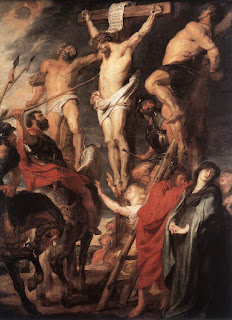God
laughed, and the light exploded.
Then
God called the new‑made Night and Day to stand before Him. “You will serve my
many sons and daughters with times for work and times for rest,” said God. “But
a day will come when high noon must yield to deep darkness—on The Day Heaven
Weeps. Be ready.”
Day
and Night looked at each other, not daring to show their puzzlement.
God
made the Sea below and the Sky above, and Sea and Sky sang splashing, crashing
praise to the Almighty.
God
called the new‑made
Sea
Then
God spoke to the land and said, “Bring forth green growing things—towering and
tiny, twirling and twining, beautiful and bizarre.” And plants covered the
land.
To
the plants, God said, “You will serve my many sons and daughters with your
fruits and flowers.”
Then
He spoke to one tree. “You will bring forth trees in many generations, and your
branch will not wither.”
The
tree shook its leaves for joy.
“But
one of your descendants will be hewn down to become the wood for a great
sacrifice—on The Day Heaven Weeps.”
And
the tree felt a sudden stinging sadness, but it was an honor to share in the
sadness of Creator.
Then
God grabbed great gobs of light and rolled them in His hands like clay to form
the golden sun, the silver moon, and all the diamond stars. “You will serve my
many sons and daughters,” said God, “lighting their paths by day and by night.”
And He grabbed another handful of the light that shone from His heart and flung
it into space.
“Fly,
little star—fly through the years and come to rest at the appointed time, on a
wretched night, in a nowhere town, over a sorry‑looking cattle shed.”
And
the little star flew through the years and tears and fears of mankind.
Then
God made the Fishes that swim in the sea and the Birds that fly through the
air.
“You
will serve my many sons and daughters. They will learn to catch fish, until He
comes who will teach them to fish for men. And Birds, you will teach them that
they were not destined for the dust but for the skies.”
And
God formed all the living creatures that dwell on the earth. “You will serve my
many sons and daughters,” said God to the creatures, “by carrying their burdens
and by giving them food and coverings. Your sacrifice for my children will be
the greatest among created things—until The Day Heaven Weeps.”
These
words were strange to the creatures, for why would sons and daughters of God
have burdens or be hungry or need coverings?
And
last of all, God made man—both male and female. God clothed them with the light
that shone from His heart. And they were splendid, but they didn't know it
because they were so taken with the beauty of Creator.
“Look
upon your many servants,” said God. “And you shall be my dear children, Adam
and Eve.” And God saw that all of His making was very, very good.
+++++
One
day at dusk, a great angel flew into the Presence.
“Holy,
holy, holy,” shouted the angel. “You are worthy to receive glory and honor and
power.”
And
all of the heavenly hosts cried, “Holy!”
“Is
all in readiness?” asked God.
“Yes,
Lord. Every created thing knows the part it must play.”
The angel
looked perplexed. “Um. . .except. . .um, that is. . .” The angel blushed. He was unaccustomed to
being tongue‑tied.
And
the Lord God went down in the cool of the day to walk in the Garden.
“Adam.
. . ?”
No
answer.
God,
of course, sees everything, and He could see Adam hiding behind a thick curtain
of sorrow. The light was all gone and he had tried to cover himself with
leaves.
“You
don't know what I've done,” said Adam, and bitter tears filled his eyes.
“I
do know,” said God.
And God looked into time‑to‑come and saw a dark noon, a fierce storm, a hewn tree—His Son dying.
And God looked into time‑to‑come and saw a dark noon, a fierce storm, a hewn tree—His Son dying.
“God,
I can't see you anymore,” said Adam.
“It's
all right. I can see you.”
Thunder rumbled on the distant horizon.
Thunder rumbled on the distant horizon.
“I'm
naked,” said Adam. And he shivered with cold and with fear.
The
whoosh of wings that always surrounded God was
The
breath of God within the man came in short gasps. “I think I’m dying,” said
Adam.
And
God stooped down and gathered Adam and all the sorrow of the world into His arms. “I’m dying
too,” said God. “I'm dying so that you can live.”
Adam
couldn’t understand these words—for he couldn’t see what God could see. But he
understood the tears falling on him from the face of God.










.jpg)




































